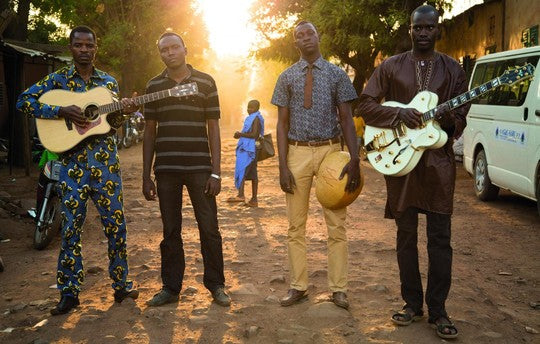Your Cart is Empty

A recently published article by World Music Network (WMN) compiler Andy Morgan has prompted a long over due discussion concerning the armed conflict in Mali. There was no rhythm or reason for the August 2012 Islamic rebel ban on music in Mali. During that time, the strict ban forced musicians and chiefs alike to seek refuge from a region where music is valued as the cornerstone of their culture. As 'Manny' Ansar, the director of Mali’s celebrated Festival in the Desert in a Guardian article explained: “It’s through our music that we know history and our own identity. Our elders gave us lessons through music. It’s through music that we declare love and get married.”
In light of the recent (Feburary 2015) ceasefire between all forces, WMN expresses sympathises with the nation of Mali as the social, politial and cultural climate finally takes a positive step. The ban was said to be of sharia law (an extreme interpretation) used by militants in order to impose further authority. Families had televisions smashed for simply watching shows where music was playing in the background. Public concerts and musical gatherings were canceled due to persistent fear terrorist attacks. Futhermore, radio stations were destroyed, instruments burned and musicians even facing torture and death.
Keeping an ear to the ground for today’s Malian sounds, these tunes were specially recorded for this release and feature inspirational new artists yet to be heard outside their homeland.
Available now on CD, Download & with Subscription
WMN has worked extensively with several Malian musicians to produce and record several albums including 'Lost in Mali', 'The Rough Guide To The Music Of Mali', 'The Rough Guide To The Music Of The Sahara' and more. Hence the devestation brought upon such a musically rich and vibrant country is one which hits home. This sentiment is shared in particular with former Tinariwen (Malian band) manager and Rough Guide compiler, Andy Morgan. 'Music, Conflict and Culture in Mali' (2013) and regularly published articles, written by Morgan himself highlights this horrific 21st century conflict. Despite the ban being lifted in Feburary 2013, Morgan writes of the continued economic, politial and social effects of the ban on the entire nation.
In addition, many significant Malian musicians were forced to flee their homes to live in exile during this time. These included the band Tinariwen (who have performed with the Rolling Stones), Salif Keita, Toumani Diabaté, Amadou & Mariam, and Rokia Traoré. A recently released documentary 'They Will Have to Kill Us First' (2015) tells a dangerous story about the Islamic Jihadist regime, and the Malian musicians who banded together to resist a life without music. Featuring the stories of Disco & Jimmy, Khaira, Moussa, and internationally recognised band Songhoy Blues.
'Music, Conflict and Culture in Mali' (2013) perhaps put it best as it shares human experiences rather than anonymous statistics, highlighting the necessity for culture as a tool for unification in times of crisis. This is due to the fact that cultural areas such as music and theatre, reaches beyond broad social classes. Further, Morgan notes that 'it is clear that there's nothing conclusive about the current state of affairs in Mali'. However, despite the uncertainty of the future, one thing is for sure. Regardless of the hardship endured by Malian musicians, their music remains the beating heart of Malian culture. Hence we can only hope Malian culture continues to be a valuable resource to a building a vibrant and stable state.
Watch 'They Will Have to Kill Us First' Trailer: